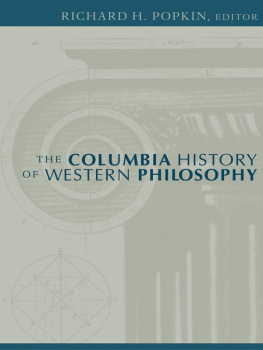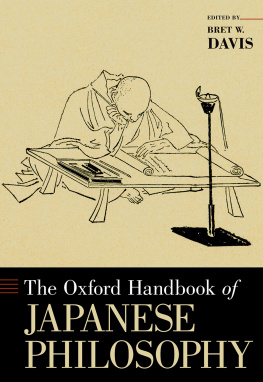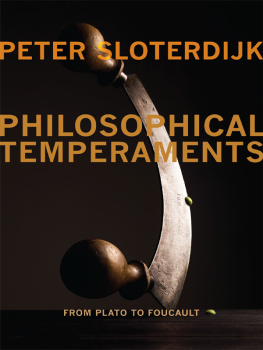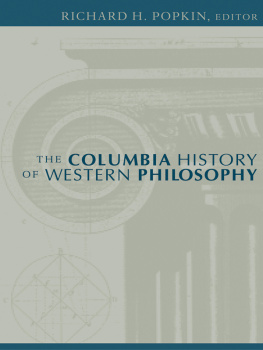The Columbia History of Western Philosophy
The Columbia History of Western Philosophy
Edited by Richard H. Popkin
COLUMBIA UNIVERSITY PRESS
New York

Columbia University Press
Publishers Since 1893
New York Chichester, West Sussex
cup.columbia.edu
Copyright 1999 by Columbia University Press
All rights reserved
E-ISBN 978-0-231-50034-0
Library of Congress Cataloging-in-Publication Data
Popkin, Richard Henry
The Columbia history of Western philosophy / Richard H. Popkin.
p. cm.
Includes bibliographical references and index.
ISBN 0231101287 (alk. paper)
1. PhilosophyHistory. I. Title.
B72.P55 1998
190dc21 9815219
A Columbia University Press E-book.
CUP would be pleased to hear about your reading experience with this e-book at .
I should like to dedicate this volume to my wife, Juliet. She knew me when, as a young student at Columbia College, I first became interested in the history of philosophy. She has supported me over more than half a century as I have researched and written on various aspects of that history. And in the three years of the preparation and completion of this volume, she has been an invaluable consultant, helping me overcome a host of crises. I hope that this volume is worthy of all of her help.
Contents
Stephen F. Brown
Stephen F. Brown
Stephen F. Brown
Stephen F. Brown
Stephen F. Brown
Stephen F. Brown
Stephen F. Brown
Stephen F. Brown
Avrum Stroll
Avrum Stroll
Avrum Stroll
Avrum Stroll
Avrum Stroll
Avrum Stroll
Avrum Stroll
Avrum Stroll
Avrum Stroll
Avrum Stroll
Avrum Stroll
I should like to take this opportunity to thank those who have aided me in the preparation of this volume.
First of all, I should like to thank Robert John Arias, a former student of mine, who did much of the initial work looking over the contributions and getting them organized in a common computer program. He gave me much valuable advice in putting the entire volume together.
Next, I owe much gratitude to four research assistants of the Seventeenth and Eighteenth Century Center at UCLA, Kimberley Garmoe, Russell Ives Court, Anna Suranyi, and Tim Corrall, who most ably aided me in finishing the volume, editing manuscripts, doing library research, and many other tasks.
Then, I should like to take this opportunity to thank Franz Peter Hugdahl of Columbia University Press, with whom I have been in almost constant communication. We have worked out many critical problems together, and he has worked valiantly to finally bring the volume to publication.
Thanks are also due to Keith Frome, formerly of Columbia University Press, who first suggested to me that I undertake the task of organizing a new one-volume history of Western philosophy, and to James Raimes of the Research Publishing Division of Columbia University Press, who supervised the venture at the publishers end and who has always been most helpful in assisting me in overcoming various problems and difficulties.
In addition, I should like to thank all of the contributors for their excellent work and for jointly making this a volume that we all can be proud of.
Finally, I would like to express my personal feeling of satisfaction that it was my alma mater, Columbia University, that proposed this project to me. Columbias philosophy department has been in the forefront of those encourging the serious scholarly study of the history of philosophy throughout this century, even while it was being abandoned in many other intellectual centers. It was at Columbia, as both an undergraduate and graduate student, that I was able to study the history of philosophy with distinguished professors including John Herman Randall and Herbert W. Schneider, who later encouraged me in my researches over the last half century. I owe special thanks to Paul Oskar Kristeller who taught me and encouraged me and who also examined my plan for this volume and made several significant suggestions.
There have been many histories of philosophies, but few presented in one large volume for the educated layman. Two such ventures that have endured for many decades, The Story of Philosophy by Will Durant and Bertrand Russells A History of Western Philosophy, are eminently readable, but cover only the high spots of the field. Durant, who was a very popular lecturer on philosophy at Columbia University, primarily discusses only a few of the great men. Nevertheless, his popularization has been a gateway into philosophy for a great many readers during much of this century. Russell wrote his book hastily out of financial desperation while jobless in New York City at the beginning of World War II. Since Russell was a scholar of very few of the topics he covered, and uninterested or hostile to others, his opus is most engaging as Russelliana but hardly as history of philosophy. Both Durants and Russells works are still in print and are widely available in paperback editions.
This work is not intended to compete with these classics. During the last half century the number of new serious scholarly findings and interpretations concerning various portions of the history of philosophy has increased enormously. Previously unknown materials by and about various major figures in the history of philosophy have been discovered. The manuscripts of important figures from ancient times to the present have been or are being edited, increasing our understanding of the authors. For example, an edition of John Lockes writings based on previously unknown manuscripts has begun to see print; the edition of G. W. Leibnizs unpublished writings started in the 1920s continues to produce new volumes. New historical perspectives are being cast upon the materials, so that they can now be seen in their full intellectual and social contexts instead of as just isolated systems of ideas.
All of this has led to many multivolume histories of different portions of the history of philosophy. The enormous German berweg history of philosophy, long the standard one for detail, is now in the process of being redone with a substantial increase in depth of coverage and amount of material; when completed, it will finally consist of dozens of highly specialized volumes. Large histories of various periods in the history of philosophy have also been issued, as well as countless volumes about individual philosophers.
In the light of all that has been discovered, edited, and reinterpreted, it seems appropriate to attempt to put together much of the new material and many of the new interpretations, as well as updated explanations and analyses of the accepted history of philosophy, in a form in which nonprofessional readers can appreciate the riches now available in the field. I have been concerned to give due attention to certain portions of the history of philosophy that much too often have been overlooked. After setting forth ancient Greek philosophy from the pre-Socratics to Plato and Aristotle, we then turn to a detailed presentation of Hellenistic philosophy, which is too frequently ignored or slighted. The philosophies of the Epicureans, the Stoics, and the Scepticsthe sources of modern materialism, scepticism, and forms of neo-Stoicismare examined. Neoplatonism, a philosophical system that played a great role in the various forms of Renaissance and Cambridge Platonism, is fully described here, though scholars have often written it off as too mystical. We also go into the development of philosophical forms of Judaism and Christianity that developed from the first century onward.
Next page










